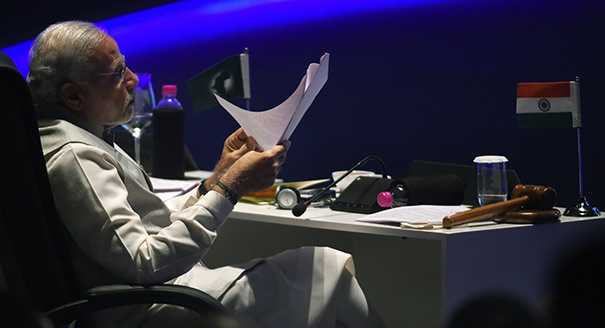C. Raja Mohan, Darshana M. Baruah
{
"authors": [
"C. Raja Mohan"
],
"type": "legacyinthemedia",
"centerAffiliationAll": "dc",
"centers": [
"Carnegie Endowment for International Peace",
"Carnegie India"
],
"collections": [],
"englishNewsletterAll": "",
"nonEnglishNewsletterAll": "",
"primaryCenter": "Carnegie India",
"programAffiliation": "SAP",
"programs": [
"South Asia"
],
"projects": [],
"regions": [
"South Asia",
"Pakistan",
"India"
],
"topics": [
"Foreign Policy"
]
}
Source: Getty
Raja-Mandala: Retrieving the Momentum
Delhi has learnt the virtues of steadfastness in coping with the internal battles of its neighbors.
Source: Indian Express
The ongoing visit of Nepal’s Prime Minister K P Sharma Oli may not have resolved all of New Delhi’s current differences with Kathmandu. But it has done enough to defuse the recent crisis in bilateral relations. The visit also underlines the renewed energy in Prime Minister Narendra Modi’s neighbourhood diplomacy.
Back in May 2014, Modi invited all the leaders of the neighbouring countries for the inauguration of his government. The subcontinent was eager to welcome a strong government in Delhi that promised to focus on the region. The popular enthusiasm for Modi when he visited Nepal in August 2014 demonstrated India’s new diplomatic possibilities in the region. The euphoria, however, did not take long to fade as the complex regional dynamics provided a reality check to Modi’s diplomacy.The suspension of talks with Pakistan in August 2014 and the ambivalence of the Nepali political class towards Modi when he travelled to Kathmandu the second time in November 2014 showed that an effective regional policy needs more than a mere demonstration of goodwill.
The last-minute cancellation of the PM’s visit to the Maldives in March 2015, following the arrest of former president Mohamed Nasheed, showed how the domestic dynamics of our neighbours cast a shadow on Delhi’s regional diplomacy. The Madhesi agitation against the new Nepal constitution promulgated in September 2015 had a much bigger effect on India’s relations with Nepal.
Delhi’s careful recalibration of regional policy since then is based on a set of sensible principles. One is the need for a sustained dialogue with the neighbours — under all circumstances. While “acting tough” may play well in India for a while, there is no alternative to patient engagement.
As then PM Atal Bihari Vajpayee used to remind us, you can choose your friends but not your neighbours. The slow but certain whittling down of differences with Nepal on the constitution shows that persistent engagement is better than diplomatic petulance.
On Pakistan, Delhi could not avoid the conclusion that suspending the dialogue with Islamabad in mid-2014 was a mistake. A year later, the PM began an effort to resume talks with Pakistan. A series of moves that began at Ufa in July 2015 culminated in Modi’s surprise landing in Lahore last Christmas. But the Pathankot attack that followed within a week did not see Delhi suspending the dialogue. The NDA government appears to have figured that not talking to Pakistan generates problems of its own. It brings all the political pressure on India to start talking — and not on Pakistan to stop supporting terror.
Delhi has also recognised that the diplomatic costs of resuming a dialogue after every suspension, as has been the pattern for the last two decades, are quite high. As a result, it has continued the engagement with Pakistan with a special focus on curbing sources of cross-border terrorism.
Second, India looms large, for good or bad, in the domestic politics of all its neighbours. Competing political factions in the smaller countries want Delhi to tilt the internal balance in their favour; and those who see Delhi leaning towards their rivals, denounce India as a regional bully.
We saw that play out in the conflict between the Madhesis and the hill elites in Kathmandu. We have also seen it in the Maldives, where power struggles between rival clans drew India in. As the political pendulum swings in these countries, alarm bells ring in India about loss of influence.
But Delhi has learnt the virtues of steadfastness in coping with the internal battles of its neighbours. It has nudged the competing groups in Nepal to find compromises on the constitution. It has bailed Nasheed out of arbitrary confinement in the Maldives. Thanks to the challenges to his authority from other sources, President Abdulla Yameen has turned to India for support.
While India is sensitive to the internal dynamics of its smaller neighbours, it seems strangely reluctant to factor in Pakistan’s domestic politics in its strategy towards the western neighbour. Instead of seeing Pakistan as a black box, Delhi should be reaching out to all the key actors across the border.
That brings us to the power of proximity. India is bound to its neighbours through geography. India’s neighbours often play the “China card” much to Delhi’s irritation. Like the failed Nepali efforts to import significant quantities of oil from its northern neighbour amid the “southern blockade”, there are significant limits to mobilising “external powers” against India.
In Sri Lanka, the opposition to then President Mahinda Rajapaksa’s China play came from the domestic opposition groups who prevailed in last year’s elections. But as the world’s second-largest economy and a great power, there is no way India can erect a “Great Wall” against Chinese influence in the subcontinent.
An India that builds on its natural geographic advantages in South Asia, resolves outstanding political disputes, deepens regional economic integration and expands security cooperation with its neighbours, will have little reason to be concerned about the role of external powers in the subcontinent.
This article was originally published in the Indian Express.
About the Author
Former Nonresident Senior Fellow, Carnegie India
A leading analyst of India’s foreign policy, Mohan is also an expert on South Asian security, great-power relations in Asia, and arms control.
- Deepening the India-France Maritime PartnershipArticle
- Shanghai Cooperation Organization at Crossroads: Views From Moscow, Beijing and New DelhiCommentary
- +1
Alexander Gabuev, Paul Haenle, C. Raja Mohan, …
Recent Work
Carnegie does not take institutional positions on public policy issues; the views represented herein are those of the author(s) and do not necessarily reflect the views of Carnegie, its staff, or its trustees.
More Work from Carnegie Endowment for International Peace
- Europe on Iran: Gone with the WindCommentary
Europe’s reaction to the war in Iran has been disunited and meek, a far cry from its previously leading role in diplomacy with Tehran. To avoid being condemned to the sidelines while escalation continues, Brussels needs to stand up for international law.
Pierre Vimont
- India Signs the Pax Silica—A Counter to Pax Sinica?Commentary
On the last day of the India AI Impact Summit, India signed Pax Silica, a U.S.-led declaration seemingly focused on semiconductors. While India’s accession to the same was not entirely unforeseen, becoming a signatory nation this quickly was not on the cards either.
Konark Bhandari
- How Far Can Russian Arms Help Iran?Commentary
Arms supplies from Russia to Iran will not only continue, but could grow significantly if Russia gets the opportunity.
Nikita Smagin
- Is a Conflict-Ending Solution Even Possible in Ukraine?Commentary
On the fourth anniversary of Russia’s full-scale invasion, Carnegie experts discuss the war’s impacts and what might come next.
- +1
Eric Ciaramella, Aaron David Miller, Alexandra Prokopenko, …
- Indian Americans Still Lean Left. Just Not as Reliably.Commentary
New data from the 2026 Indian American Attitudes Survey show that Democratic support has not fully rebounded from 2020.
- +1
Sumitra Badrinathan, Devesh Kapur, Andy Robaina, …















